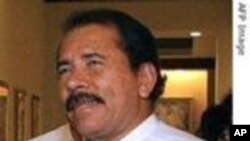<!-- IMAGE -->Latin American nations in recent years have wrestled with presidential term limits, restrictions placed on how long an individual may serve in high office that were seen as an antidote to the long-running personal dictatorships once common to the region.
Leaders have sought constitutional changes to let them run for additional terms, a process that sets the stage for re-election campaigns that serve as a national referendum on such change. In seeking the right to serve a third term, Nicaragua's President, Daniel Ortega, has taken a different approach, one that threatens democratic governance there.
Acting on a request by Mr. Ortega and a group of municipal mayors loyal to him, a panel of the Nicaraguan Supreme Court struck down a constitutional provision prohibiting a sitting president and sitting mayors from running again for those respective offices, thereby clearing the way for Mr. Ortega to run for a third term in 2012. By taking the matter to a court consisting solely of magistrates from his own party, Mr. Ortega avoided having to seek to change the constitution through passing an amendment in the National Assembly, where he does not have a majority. He also avoided a public referendum on the issue.
Under the constitution, only the National Assembly can change the constitution. It doesn't give the Supreme Court the authority to rule on the legality of constitutional provisions.
The United States is very concerned about the manner in which the Constitutional Chamber of the Nicaraguan Supreme Court reached its decision. It shares the feeling of many Nicaraguans that the situation is part of a larger pattern of questionable and irregular government actions that threaten to undermine the foundations of their nation's democracy. Through legal maneuvering, the court's ruling appears to block an open and transparent dialogue by the Nicaraguan people to decide on the possibility of the re-election of not only the president, but many other government offices in that country.
Attempts to short circuit constitutional authority, regardless of ideology or country, threaten democratic governance and are of concern to all members of the Organization of American States.
Leaders have sought constitutional changes to let them run for additional terms, a process that sets the stage for re-election campaigns that serve as a national referendum on such change. In seeking the right to serve a third term, Nicaragua's President, Daniel Ortega, has taken a different approach, one that threatens democratic governance there.
Acting on a request by Mr. Ortega and a group of municipal mayors loyal to him, a panel of the Nicaraguan Supreme Court struck down a constitutional provision prohibiting a sitting president and sitting mayors from running again for those respective offices, thereby clearing the way for Mr. Ortega to run for a third term in 2012. By taking the matter to a court consisting solely of magistrates from his own party, Mr. Ortega avoided having to seek to change the constitution through passing an amendment in the National Assembly, where he does not have a majority. He also avoided a public referendum on the issue.
Under the constitution, only the National Assembly can change the constitution. It doesn't give the Supreme Court the authority to rule on the legality of constitutional provisions.
The United States is very concerned about the manner in which the Constitutional Chamber of the Nicaraguan Supreme Court reached its decision. It shares the feeling of many Nicaraguans that the situation is part of a larger pattern of questionable and irregular government actions that threaten to undermine the foundations of their nation's democracy. Through legal maneuvering, the court's ruling appears to block an open and transparent dialogue by the Nicaraguan people to decide on the possibility of the re-election of not only the president, but many other government offices in that country.
Attempts to short circuit constitutional authority, regardless of ideology or country, threaten democratic governance and are of concern to all members of the Organization of American States.




